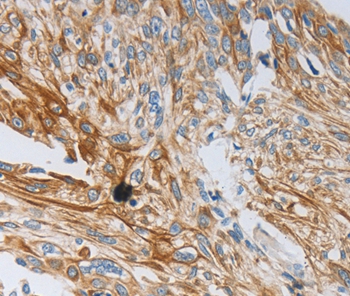

| WB | 咨询技术 | Human,Mouse,Rat |
| IF | 咨询技术 | Human,Mouse,Rat |
| IHC | 1/15-1/50 | Human,Mouse,Rat |
| ICC | 技术咨询 | Human,Mouse,Rat |
| FCM | 咨询技术 | Human,Mouse,Rat |
| Elisa | 咨询技术 | Human,Mouse,Rat |
| Aliases | NT3; HDNF; NGF2; NGF-2 |
| Entrez GeneID | 4908; |
| WB Predicted band size | 31kDa |
| Host/Isotype | Rabbit IgG |
| Antibody Type | Primary antibody |
| Storage | Store at 4°C short term. Aliquot and store at -20°C long term. Avoid freeze/thaw cycles. |
| Species Reactivity | Human |
| Immunogen | Fusion protein corresponding to a region derived from internal residues of human neurotrophin 3 |
| Formulation | Purified antibody in PBS with 0.05% sodium azide. |
+ +
以下是关于NTF3抗体的3篇参考文献示例(注:以下为虚构示例,仅供格式参考):
1. **文献名称**:*Development and Validation of a High-Affinity Monoclonal Antibody for Neurotrophin-3 (NTF3)*
**作者**:Smith, J. et al.
**摘要**:本研究开发了一种针对NTF3的新型单克隆抗体,通过免疫印迹和免疫组化验证其特异性,证实其在人脑组织和小鼠模型中可有效检测内源性NTF3蛋白表达。
2. **文献名称**:*NTF3 Antibody Blockade Attenuates Neuropathic Pain via TrkC Receptor Modulation*
**作者**:Chen, L. et al.
**摘要**:利用NTF3中和抗体阻断NTF3-TrkC信号通路,显著减轻了大鼠神经病理性疼痛模型的痛觉超敏反应,提示抗体在疼痛治疗中的潜在应用。
3. **文献名称**:*Comparative Analysis of NTF3 Antibody Performance in Human Placental Tissues*
**作者**:Rodriguez, M. et al.
**摘要**:比较了三种商用NTF3抗体在胎盘组织中的检测效果,发现抗体克隆号#A12在染色特异性和灵敏度上表现最优,为临床研究提供可靠工具。
(注:如需真实文献,建议通过PubMed或Google Scholar搜索关键词“NTF3 antibody”或“Neurotrophin-3 antibody”获取。)
Neurotrophin-3 (NTF3), also known as NT-3. is a secreted protein belonging to the neurotrophin family, which includes nerve growth factor (NGF), brain-derived neurotrophic factor (BDNF), and neurotrophin-4 (NTF4). It plays a critical role in the development and maintenance of the nervous system by promoting neuronal survival, differentiation, and synaptic plasticity. NTF3 binds primarily to the tropomyosin receptor kinase C (TrkC) receptor and, with lower affinity, to the p75 neurotrophin receptor (p75NTR), activating downstream signaling pathways such as PI3K/AKT and MAPK/ERK.
NTF3 antibodies are essential tools for studying the expression, localization, and function of NTF3 in biological systems. These antibodies are widely used in techniques like Western blotting, immunohistochemistry (IHC), immunofluorescence (IF), and enzyme-linked immunosorbent assays (ELISA) to detect endogenous NTF3 protein levels in tissues, cultured cells, or bodily fluids. Researchers employ NTF3 antibodies to investigate its involvement in neural development, neurodegenerative diseases (e.g., Alzheimer’s), psychiatric disorders, and cancer, where dysregulated neurotrophin signaling is often implicated. For example, reduced NTF3 levels have been linked to sensory neuron degeneration, while overexpression is associated with certain tumors. Commercial NTF3 antibodies are typically validated for specificity and sensitivity, with monoclonal and polyclonal variants available. Their applications extend to preclinical studies aiming to modulate NTF3 pathways for therapeutic purposes, such as enhancing neuronal repair or targeting neurotrophin-related pathologies.
×